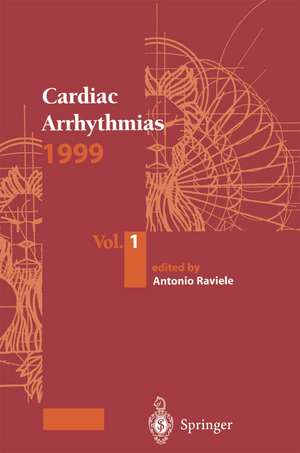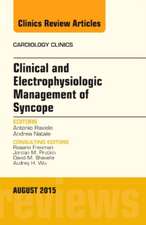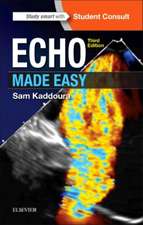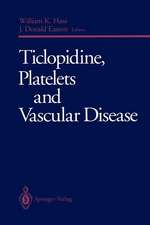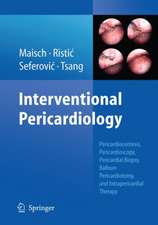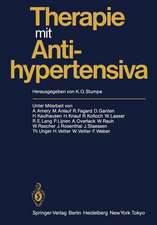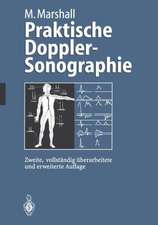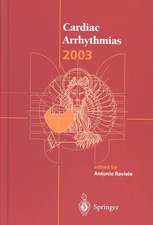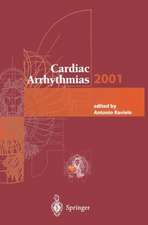Cardiac Arrhythmias 1999: Vol.1. Proceedings of the 6th International Workshop on Cardiac Arrhythmias (Venice, 5–8 October 1999)
Editat de Antonio Ravieleen Limba Engleză Paperback – 14 oct 2012
| Toate formatele și edițiile | Preț | Express |
|---|---|---|
| Paperback (1) | 385.94 lei 6-8 săpt. | |
| Springer – 14 oct 2012 | 385.94 lei 6-8 săpt. | |
| Hardback (1) | 670.88 lei 6-8 săpt. | |
| Springer – 31 oct 1999 | 670.88 lei 6-8 săpt. |
Preț: 385.94 lei
Preț vechi: 406.25 lei
-5% Nou
Puncte Express: 579
Preț estimativ în valută:
73.86€ • 76.83$ • 60.97£
73.86€ • 76.83$ • 60.97£
Carte tipărită la comandă
Livrare economică 14-28 aprilie
Preluare comenzi: 021 569.72.76
Specificații
ISBN-13: 9788847021785
ISBN-10: 8847021782
Pagini: 612
Ilustrații: XVIII, 591 p.
Dimensiuni: 155 x 235 x 32 mm
Greutate: 0.84 kg
Ediția:2000
Editura: Springer
Colecția Springer
Locul publicării:Milano, Italy
ISBN-10: 8847021782
Pagini: 612
Ilustrații: XVIII, 591 p.
Dimensiuni: 155 x 235 x 32 mm
Greutate: 0.84 kg
Ediția:2000
Editura: Springer
Colecția Springer
Locul publicării:Milano, Italy
Public țintă
Professional/practitionerCuprins
Lectures.- Sudden Ischemic Cardiac Death: The Clinical Approach.- Molecular Pathology of Cardiac Diseases Liable to Cause Sudden Death.- Atrial Fibrillation.- Are All Paroxysms of Atrial Fibrillation Focally Initiated?.- How Common Is a Genetic Origin of Atrial Fibrillation?.- Lone Atrial Fibrillation: What Is the Anatomical and the Electrophysiological Substrate?.- Atrial Fibrillation in Apparently Idiopathic Cardiomyopathy: The Chicken or the Egg?.- Cardioversion for Atrial Fibrillation Today: When and Why?.- Acute Conversion of Recent-Onset Atrial Fibrillation and Flutter: Class IC or Class III Drugs?.- Antiarrhythmic Drug Therapy Before Electrical Cardioversion of Atrial Fibrillation: Is It Really Useful?.- Low-Energy Internal Defibrillation: How Many Patients Are Still in Sinus Rhythm After 1 Year?.- How Useful Is Transoesophageal Echocardiography During Electrical Cardioversion for Predicting Long-Term Sinus Rhythm Maintenance?.- Atrial Stunning Following Sinus Rhythm Restoration: Which Mechanism, Time Course and Implication for Anticoagulation?.- Drug Prevention of Atrial Fibrillation: Are Novel Agents More Effective Than the Old Ones?.- Atrial Pacing for Prevention of Atrial Fibrillation: Where and How to Stimulate?.- Implantable Atrial Defibrillator: What are the Results of Initial Experience?.- Implantable Atrial Defibrillator: What Are the Future Perspectives?.- Implantable Atrial Defibrillator: Why not a Patient-Activated Drug Delivery System?.- Ablation of Atrial Fibrillation: How Should Patients Be Selected?.- An Anatomical Approach to Curing Atrial Fibrillation: Pulmonary Vein Isolation with Through-the-Balloon Ultrasound Ablation.- Ablate and Pace Therapy or AV Junction Modification for Medically Refractory Atrial Fibrillation?.- Atrial Fibrillation After Heart Surgery: How to Identify and Protect Predisposed Patients?.- Other Supraventricular Tachycardias.- Clinically Documented but Not Inducible Atrioventricular Nodal Reentrant Tachycardia: To Ablate or Not To Ablate?.- Permanent Junctional Reentry Tachycardia: When to Ablate, Where and With Which Results?.- How to Predict and Avoid Complete AV Block Complicating Radiofrequency Ablation of AV Nodal Slow Pathway.- Ablation of Antero-Septal and Intermediate Septal Accessory Pathways: How Safe Is It? How Can One Minimize the Risk of AV Block?.- Acute Treatment of Atrial Flutter: Ibutilide, Transesophageal Pacing, or DC Shock?.- Chronic Atrial Flutter: What Is the Risk of Thromboembolism?.- Common and Uncommon Atrial Flutter: What Are the Long-Term Results and Complications of Radiofrequency Ablation?.- Atrial Tachycardia Originating from Crista Terminalis.- “Incisional” Reentrant Atrial Tachycardia: How to Prevent and Treat It?.- Treatment of Tachyarrhythmias Using Cryothermal Energy.- Ventricular Arrhythmias.- Idiopathic Ventricular Fibrillation: Is the Prognosis Always Bad?.- The Syndrome of Right Bundle Branch Block, ST Segment Elevation in V1 to V3 and Sudden Death. Are Asymptomatic patients at high risk for sudden death?.- Is Atrial Vulnerability Increased In Arrhythmogenic Right Ventricular Cardiomyopathy?.- Is Right Ventricular Outflow Tract Tachycardia a Minor Form of Arrhythmogenic Right Ventricular Cardiomyopathy?.- Electrophysiologic Mechanisms of Polymorphic Ventricular Tachycardia/Torsade de Pointes in the Presence of Normal or Long QT.- Sudden Infant Death Syndrome and Long-QT Syndrome: What is Their Relationship?.- Brugada and Long QT Syndrome Are Two Different Diseases: True or False?.- Effect of ?-Blocker Therapy on the Frequency and Type of Cardiac Events in Patients with the Hereditary Long QT Syndrome.- Gene Therapy for Long QT Syndrome: Fact or Fiction?.- An Overview of Secondary Prevention Implantable Cardioverter-Defibrillator Trials: AVID, CIDS and CASH.- What Has Been the Impact on Clinical Practice of Recently Published Postevent ICD Trials?.- Is the Implantable Defibrillator Cost-effective?.- What Is the Best Algorithm to Discriminate Between Supraventricular and Ventricular Tachyarrhythmias?.- Transthoracic Epicardial Mapping and Ablation of Post-Infarction Ventricular Tachycardia: The Right Solution to the Problem?.- Sudden Death after Myocardial Infarction.- Risk Stratification for Serious Arrhythmic Events in Post-Infarction Patients.- What Is the Clinical and Prognostic Significance of High-Resting Sinus Rate?.- What is the Relationship Between Depression, the Autonomic Nervous System and the Risk of Death in Post-Myocardial Infarction Patients?.- Does Baroreflex Sensitivity Add Something to Noninvasive Evaluation of Post-Infarction Patients?.- Does Electrophysiologic Study Allow Further Risk Stratification in Survivors of Acute Myocardial Infarction?.- The BEST + ICD Trial: Is ICD Also Effective in the Presence of Optimized ?-Blocking Therapy?.- SEDET Trial: Is Noninvasive Evaluation Sufficient to Identify Patients at High Risk of Arrhythmia?.- DINAMIT: Does ICD Implantation Improve Life Expectancy in Survivors of Acute Myocardial Infarction?.- What Are the Clinical Implications of MUSTT?.- ALIVE Trial: How Is This Trial Design Different?.- Syncope.- What is the Value of Clinical History in Establishing the Cause of Syncope?.- Adenosine-Sensitive Syncope: Does it Really Exist?.- Idiopathic Postural Orthostatic Tachycardia: A Variant of Neurocardiogenic Syncope?.- Syncope of Unknown Origin After Electrophysiologic Study and Head-Up Tilt Test: How Useful is an Implantable Loop Recorder?.- Nitrotest Versus Isotest for Vasovagal Syncope: Do They Explore Different Mechanisms?.- Is the Type of Cardiovascular Response During Tilt Table Testing Useful for the Choice of the Treatment? The New VASIS Classification.- Midodrine for Treatment of Vasovagal Syncope.- Vasovagal Syncope: To Pace or not to Pace?.- Patient-Activated Implantable Drug Delivery System for Treatment of Vasovagal Syncope: A Simple Solution?.- Pacemaker.- Lead Extraction: How Easy and Safe Is It Today?.- Pacemaker/ICD Patients: To Anticoagulate or Not To Anticoagulate?.- How Risky Are Cellular Telephones for Patients Implanted with a Pacemaker or ICD?.- What Are the Risks for Pacemaker/ICD Patients Undergoing Magnetic Resonance Imaging or Other Medical Procedures?.- Pacemaker Treatment for Hypertrophic Obstructive Cardiomyopathy: Are Long-Term Results as Good as Short-Term Ones?.- Theophylline for Treatment of Bradyarrhythmias: When Is it Indicated?.- SSS Patients: Atrial or Dual-Chamber Pacing?.- Mobitz I AV Block: Why and When to Pace?.- Patients Implanted for AV Block: How Many Subsequently Develop Sinus Node Dysfunction?.- Optimizing the AV Delay in DDD Pacemakers: How Useful Is it?.- What Are the Long-Term Benefits of the Dual-Chamber Rate-Responsive System Driven by Contractility?.- Haemodynamic Sensors: What is Their Role in Monitoring Heart Function?.- What Is the Optimal Site for Right Ventricular Pacing: Outflow Tract or Apex?.- Treatment of Severe Heart Failure: Is Left Ventricular Pacing Alone Enough or Do We Need Biventricular Pacing?.- Multisite Biventricular Pacing to Treat Refractory Heart Failure: Why and How?.- Biventricular Pacing: Is Acute Hemodynamic Evaluation Useful to Select Patients?.
